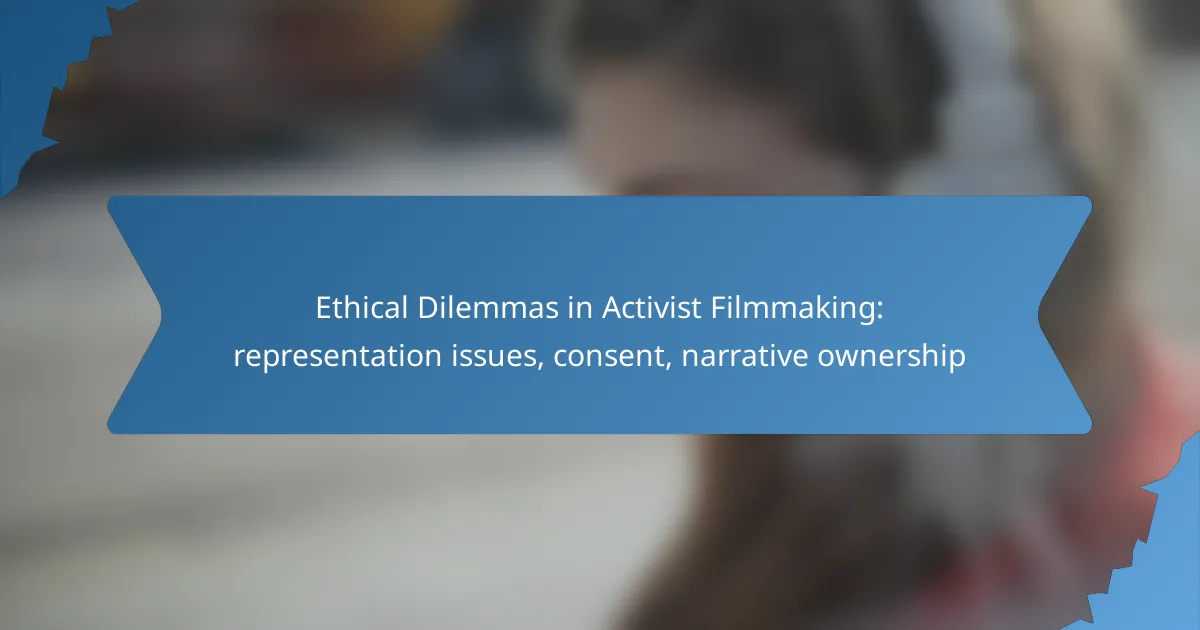Activist filmmaking grapples with complex ethical dilemmas, particularly concerning representation, consent, and narrative ownership. These challenges can profoundly influence the authenticity and impact of the stories being told, necessitating a thoughtful approach to who is represented and how their narratives are shaped. By prioritizing diverse voices and ensuring informed consent, filmmakers can enhance the integrity and effectiveness of their work.
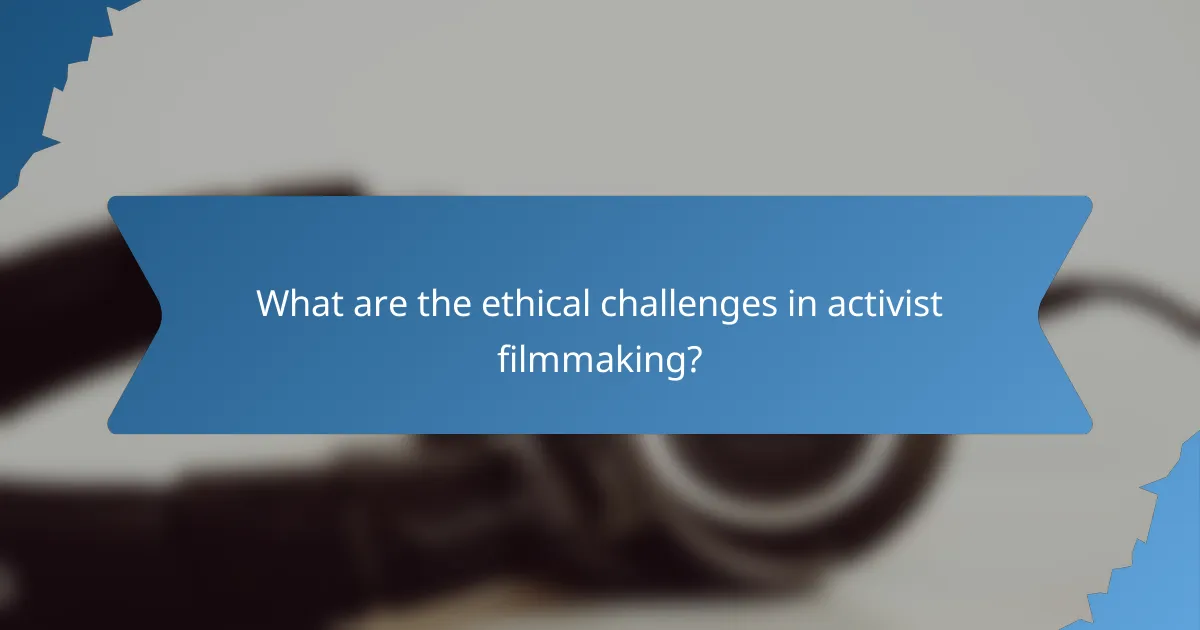
What are the ethical challenges in activist filmmaking?
Activist filmmaking faces several ethical challenges, primarily revolving around representation, consent, and narrative ownership. These issues can significantly impact the authenticity and effectiveness of the message being conveyed.
Representation issues
Representation issues in activist filmmaking concern how subjects are portrayed and the potential for misrepresentation. Filmmakers must ensure that the voices and experiences of marginalized communities are accurately reflected, avoiding stereotypes and oversimplifications.
To address these concerns, filmmakers should engage with the communities they represent, seeking input and feedback throughout the production process. This collaboration can help create a more nuanced and respectful portrayal of the subjects involved.
Consent complexities
Consent complexities arise when filmmakers seek permission from individuals to share their stories. Obtaining informed consent is crucial, as subjects must fully understand how their narratives will be used and the potential implications of their participation.
Filmmakers should provide clear information about the project, including its goals and distribution methods. Additionally, it is essential to revisit consent if the project evolves or if sensitive content is included that may not have been anticipated initially.
Narrative ownership disputes
Narrative ownership disputes occur when questions arise about who has the right to tell a story. Activist filmmakers must navigate the delicate balance between amplifying voices and inadvertently appropriating narratives from the communities they aim to support.
To mitigate these disputes, filmmakers should prioritize collaboration and co-creation with the subjects of their films. Establishing agreements that clarify ownership and rights can help ensure that all parties feel respected and valued in the storytelling process.
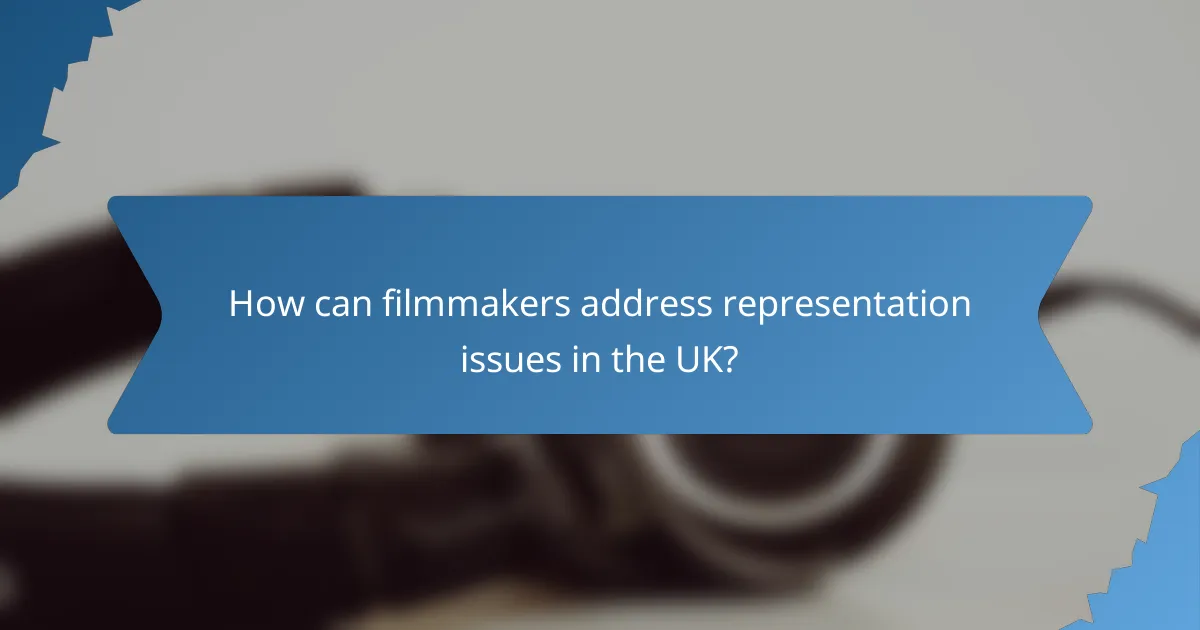
How can filmmakers address representation issues in the UK?
Filmmakers in the UK can address representation issues by prioritizing diverse voices and perspectives throughout the filmmaking process. This involves not only who is cast but also how stories are told and who gets to tell them.
Inclusive casting practices
Inclusive casting practices involve actively seeking out actors from underrepresented groups to ensure authentic representation on screen. Filmmakers should consider open casting calls and partnerships with organizations that support diverse talent to widen their reach.
Additionally, filmmakers can implement blind audition techniques to minimize bias and focus on talent rather than preconceived notions about an actor’s background. This approach can lead to richer storytelling and a more accurate reflection of society.
Community engagement strategies
Engaging with the community is essential for filmmakers aiming to represent diverse narratives authentically. This can include hosting workshops, focus groups, or discussions with community members to gather insights and feedback on the story being told.
Filmmakers should also consider collaborating with local organizations that advocate for specific communities. This partnership can help ensure that the narratives are not only accurate but also resonate with those being represented, fostering a sense of ownership and respect.
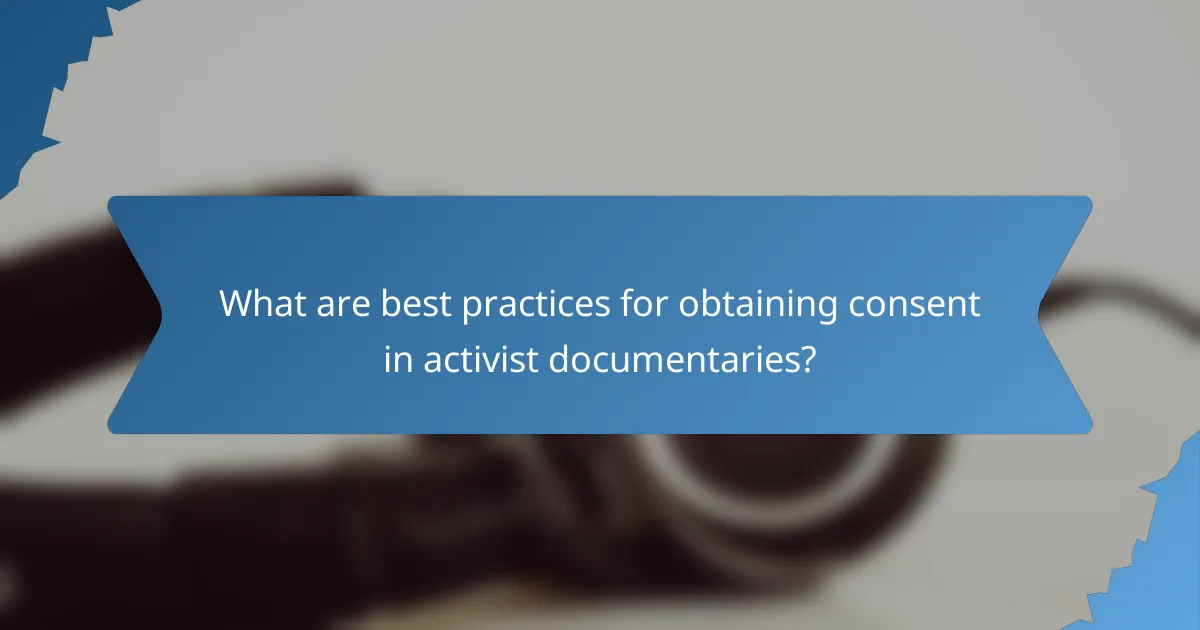
What are best practices for obtaining consent in activist documentaries?
Best practices for obtaining consent in activist documentaries involve ensuring that participants fully understand the purpose and potential impact of the film. This includes clear communication about how their stories will be used and the implications of their participation.
Informed consent protocols
Informed consent protocols require filmmakers to provide detailed information about the project to participants before filming begins. This includes the documentary’s goals, potential risks, and how the footage will be used. Filmmakers should offer participants the opportunity to ask questions and clarify any uncertainties.
It is advisable to document the consent process, using written agreements where possible. This can help protect both the filmmaker and the participants, ensuring that everyone is on the same page regarding expectations and rights.
Ongoing consent discussions
Ongoing consent discussions are crucial throughout the filmmaking process. Filmmakers should maintain open lines of communication with participants, updating them on how their stories are being portrayed and any changes in the project’s direction. This approach fosters trust and allows participants to withdraw their consent if they feel uncomfortable at any point.
Regular check-ins can also help filmmakers gauge participants’ feelings about their involvement and the representation of their narratives. This practice not only respects the participants’ autonomy but also enhances the ethical integrity of the documentary.
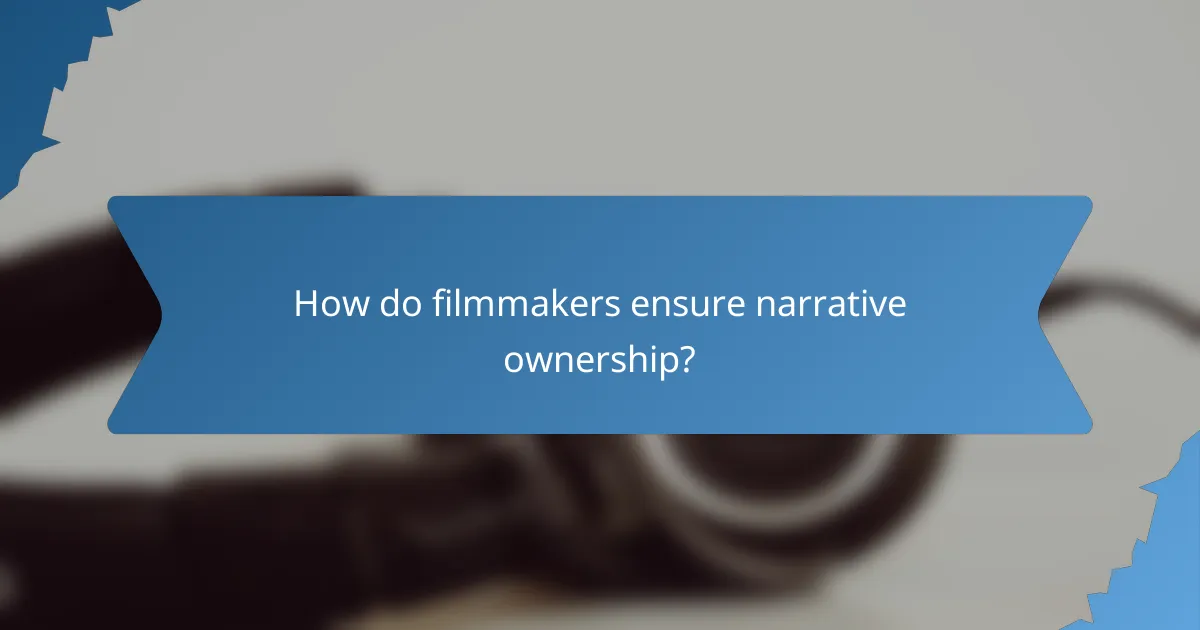
How do filmmakers ensure narrative ownership?
Filmmakers ensure narrative ownership by establishing clear agreements with all parties involved in the storytelling process. This includes obtaining consent from subjects, collaborating with communities, and respecting the cultural contexts of the narratives being portrayed.
Collaborative storytelling approaches
Collaborative storytelling involves engaging with the subjects and communities represented in the film. Filmmakers can hold workshops or discussions to gather input and feedback, ensuring that the narrative reflects the voices and experiences of those directly involved. This approach fosters a sense of shared ownership and can enhance the authenticity of the story.
For example, a documentary about indigenous culture might include community members in the scripting process, allowing them to share their perspectives and contribute to the narrative direction. This not only enriches the film but also helps to build trust and respect between filmmakers and subjects.
Legal frameworks for ownership
Legal frameworks for narrative ownership vary by country but generally include copyright laws and contracts. Filmmakers should familiarize themselves with local regulations regarding intellectual property rights to ensure that they have the necessary permissions to use the stories and images of their subjects. This may involve drafting contracts that clearly outline ownership rights and usage terms.
In the United States, for instance, obtaining a signed release form from subjects can protect filmmakers from legal disputes over narrative ownership. Additionally, filmmakers should consider the ethical implications of ownership, ensuring that the subjects are fairly compensated and credited for their contributions to the narrative.

What frameworks exist for ethical decision-making in filmmaking?
Ethical decision-making in filmmaking relies on established frameworks that guide filmmakers in navigating representation, consent, and narrative ownership. These frameworks often include ethical guidelines from professional associations, as well as case studies that highlight real-world dilemmas faced by filmmakers.
Ethical guidelines from film associations
Film associations, such as the International Documentary Association (IDA) and the Academy of Motion Picture Arts and Sciences, provide ethical guidelines that emphasize the importance of informed consent and respectful representation. These guidelines encourage filmmakers to prioritize the dignity and rights of subjects, ensuring that their stories are told authentically and accurately.
For example, the IDA’s guidelines stress the necessity of obtaining clear consent from participants, especially when dealing with vulnerable populations. Filmmakers are advised to engage in open dialogue with subjects about how their stories will be portrayed, which fosters trust and transparency.
Case studies of ethical dilemmas
Case studies illustrate the complexities of ethical dilemmas in filmmaking, often involving conflicts between artistic vision and ethical responsibilities. One notable case is the documentary “The Act of Killing,” where filmmakers faced criticism for their portrayal of former Indonesian death squad leaders, raising questions about narrative ownership and the impact of representation on historical memory.
Another example is the controversy surrounding “The Hunting Ground,” which documented campus sexual assault. While the film aimed to raise awareness, it faced backlash regarding the consent process and the potential re-traumatization of survivors. These cases highlight the need for filmmakers to carefully consider the implications of their narratives and the ethical responsibilities they hold toward their subjects.

What emerging trends are shaping ethical filmmaking practices?
Emerging trends in ethical filmmaking practices focus on enhancing representation, ensuring informed consent, and addressing narrative ownership. Filmmakers are increasingly adopting technologies and frameworks that prioritize the rights and voices of the subjects they portray.
Technological advancements in consent
Technological advancements are transforming how filmmakers obtain and manage consent from participants. Digital platforms now allow for clear, documented consent processes, ensuring that individuals fully understand their involvement and the implications of their participation.
For instance, filmmakers can use online consent forms that include video explanations, making it easier for subjects to grasp their rights. This approach not only improves transparency but also helps in building trust between filmmakers and participants.
Shifts in audience expectations
Shifts in audience expectations are driving filmmakers to adopt more ethical practices. Viewers increasingly demand authenticity and accountability in storytelling, pushing creators to consider the impact of their narratives on the communities they represent.
Audiences are more likely to support films that prioritize ethical representation and consent, leading to a preference for projects that involve collaboration with the subjects. Filmmakers should actively seek feedback from communities to ensure that their stories resonate and reflect the true experiences of those depicted.
